Summary:
1. UK water firms plan to increase the water bills of ordinary households to invest in reducing sewage leakages, but the public is already angry about their failure in sewage treatment and pollution control;
2. In September, a report found that most of the water companies failed to meet their water treatment targets, and thus the government ordered them to lower water bills;
3. The failed sewage treatment, which leads to raw sewage water being discharged directly, has been polluting the rivers and beaches in the UK. The amount is shocking.
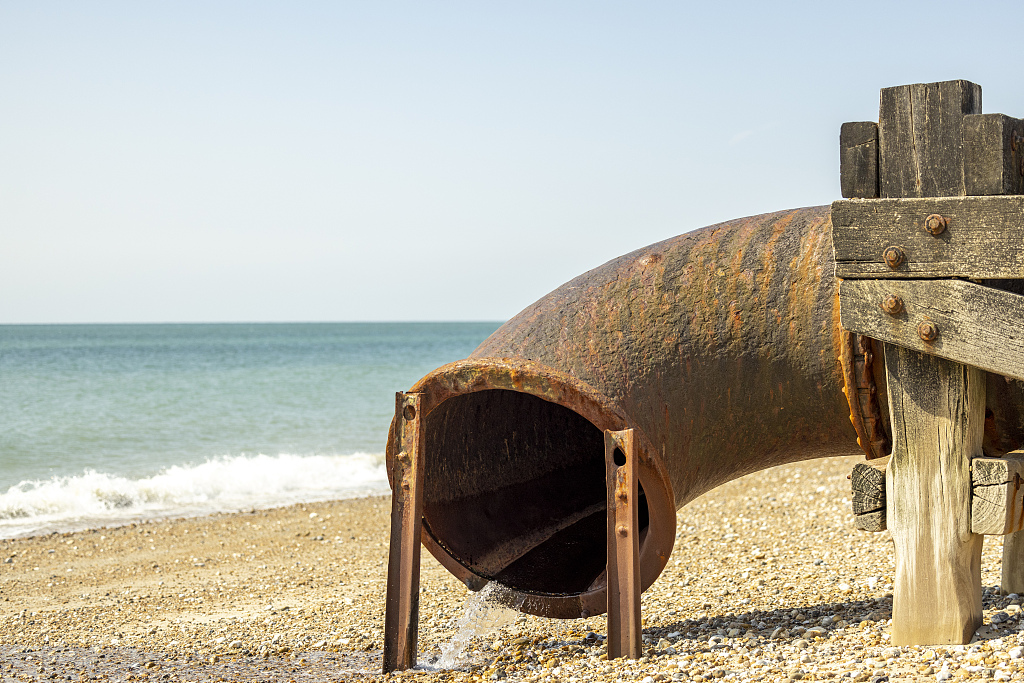
Waste water flows from a pipe at low tide on Pagham Beach in Bognor Regis, UK, June 5, 2023. /CFP
Waste water flows from a pipe at low tide on Pagham Beach in Bognor Regis, UK, June 5, 2023. /CFP
Water companies in the UK have finally heard the public anger over their failure to treat sewage which has led to pollution in the waters across the country, but their solution, raising water bills to pay for infrastructure upgrading and let the customers foot the bill, might add more fuel to the flames.
On Monday, BBC reported that water companies in England and Wales ask the Water Services Regulation Authority, or Ofwat, to approve their proposal to raise households' water bills by £156 a year by 2030 to invest in upgrades and reduce sewage discharges.
The proposal was put forward amid public outrage at the amount of sewage being discharged into rivers and seas by these companies.
According to the Guardian, the proposal has already been met with a backlash from campaigners who argued that the water companies had failed to offer services paid by customers and now are asking the customers to pay more for their failure.
England's rivers, lakes and streams among worst in Europe
"Ducks and weeds were very common. This is a beautiful plant that has a white flower on it. It (Windrush River) holds so much life, and that's gone, completely gone," 65-year-old Ash Smith, a prominent water quality campaigner in the UK told CMG as he unfolded an old photo he took.

Ash Smith, UK environmentalist, showing a photo of Windrush River he took. /CMG
Ash Smith, UK environmentalist, showing a photo of Windrush River he took. /CMG
The river view now looks very different.
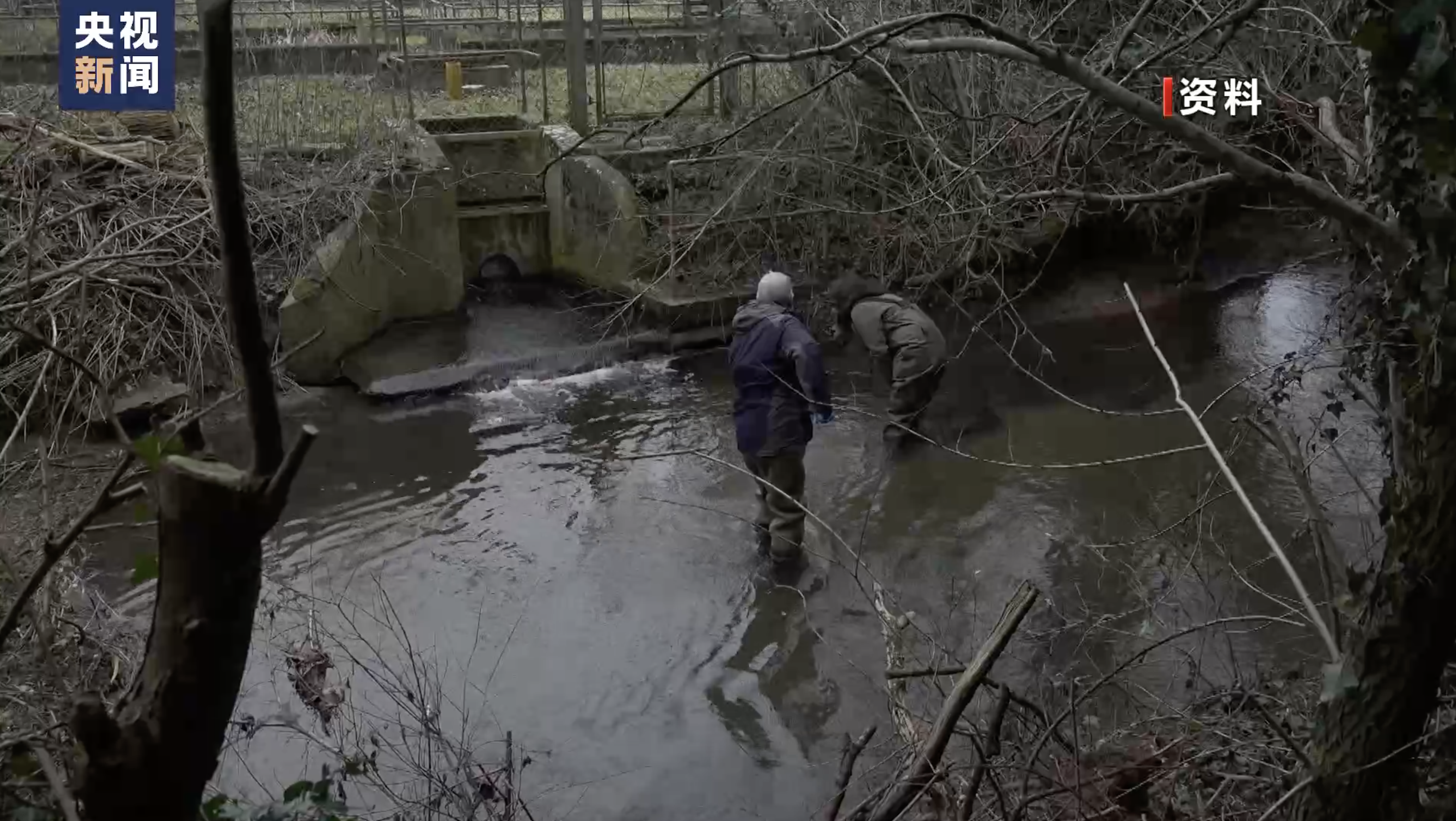
Ash Smith, UK environmentalist, and colleague checking water quality at
Windrush River, one of the tributaries of River Thames. /CMG
Ash Smith, UK environmentalist, and colleague checking water quality at
Windrush River, one of the tributaries of River Thames. /CMG
Not just in Windrush. In 2022, a House of Commons Committee report concluded that almost all of the UK's waterways are polluted as no river in England was free from chemical contamination.
The "sewage cocktail" has also made beaches in the UK too polluted to swim in. In August, at least 57 people suffered from diarrhea and vomiting after swimming in the sea during the UK leg of the World Triathlon Championship Series, putting the water quality issue under the spotlight again.
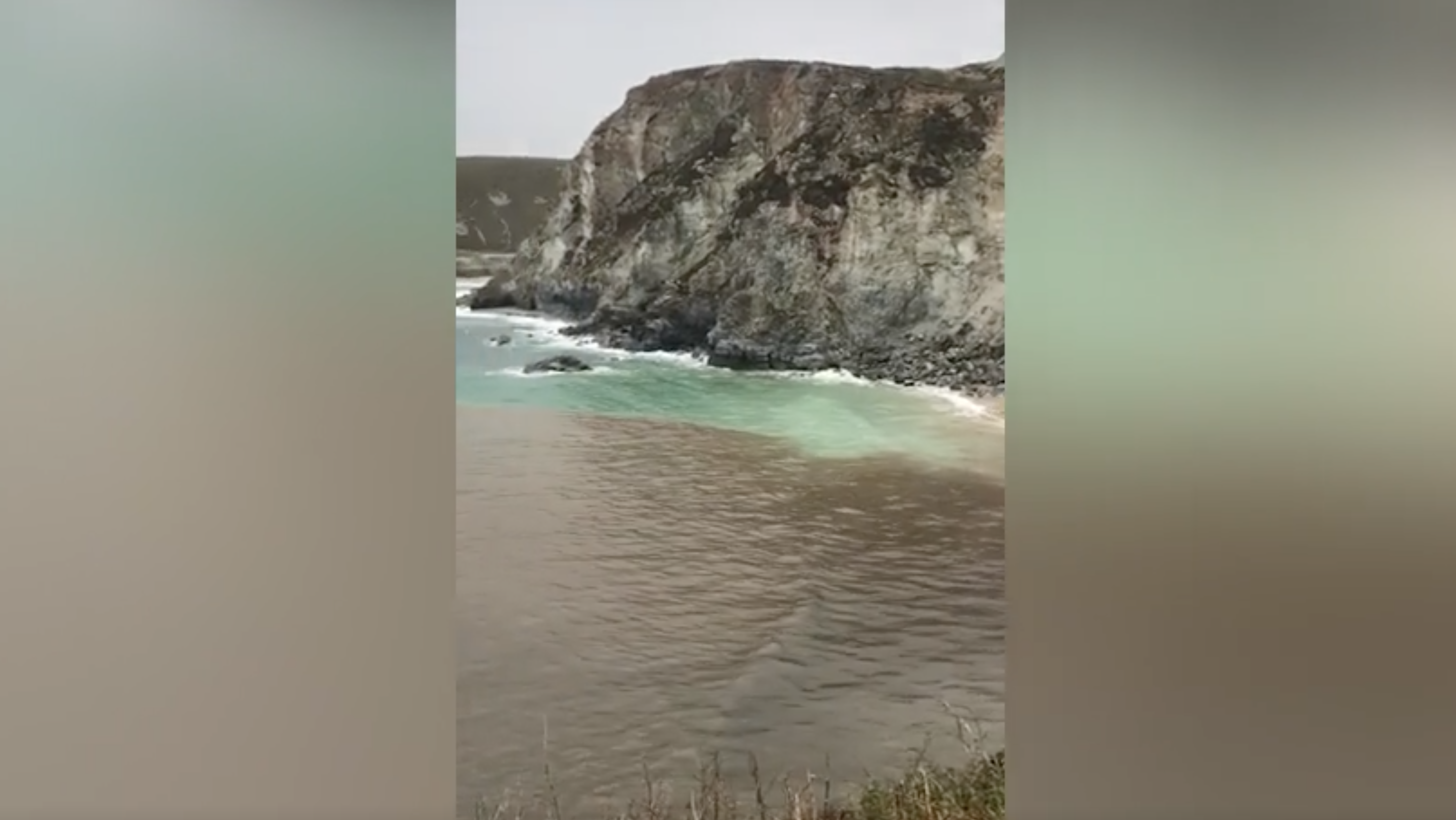
Screenshot of video showing sewage discharged into ocean at Cornwall Beach in southwest England. /CMG
Screenshot of video showing sewage discharged into ocean at Cornwall Beach in southwest England. /CMG
The British government issued warning in September against swimming at 29 popular beaches across southwest England due to safety concerns. Such warning has become commonplace in the country, as in March, swimmers were alerted to avoid 83 beaches across the nation.
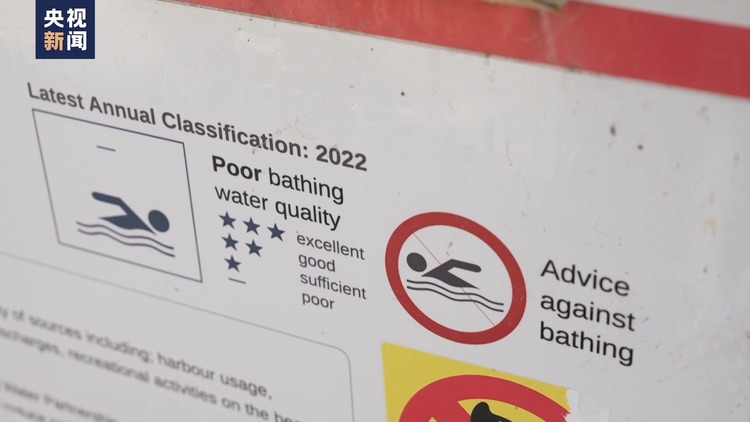
Board showing "Poor bathing water quality" at a beach in the UK. /CMG
Board showing "Poor bathing water quality" at a beach in the UK. /CMG
Shocking amount of raw sewage discharges:
These incidents have been brewing public debate, and the fingers have been pointed at the UK's sewage treatment companies since the country's water management was privatized in 1989.
Last week, BBC reported that the water companies in the UK have been ordered to pay back £114m to customers through lower bills after missing key targets. Ofwat, the industry regulator, said that most of the companies are "falling short" on performance measures around leakages, supply and reducing pollution.
The Guardian's data show that the water companies discharged raw sewage into rivers and seas more than 300,000 times last year. The number stood at over 372,000 in 2021, and more than 400,000 times in 2020.
BBC reports that most of the water companies in the UK use a combined sewerage system, meaning that both rainwater and wastewater from individual households are carried in the same pipes. The system usually works well, but not in times of torrential rains when capacity could be overwhelmed, forcing these companies to discharge the overflow into the sea and rivers.

Pipe structure buried under the sand after a storm near Blackpool's Central Pier on September 18, 2023 in Blackpool, the United Kingdom. /CFP
Pipe structure buried under the sand after a storm near Blackpool's Central Pier on September 18, 2023 in Blackpool, the United Kingdom. /CFP
Discharging storm spill is allowed in the UK, but reports say that some companies are spilling sewage on days when it is not raining, leading to illegal discharging as higher concentrations of sewage could end up in the waterways without rainwater to dilute it.
These water companies have also been accused of giving generous bonuses to their shareholders, although reports show a few of the executives have refused to accept the money in acknowledgement of the public anger.
Following the shocking figures, water companies in England apologized for their failure and promised reforms.
When these companies brought the bill-raising proposal to Ofwat, they argued that more money is urgently needed to enable the companies to invest in improving water infrastructure.
But water campaigners are criticizing it and the public are not buying that argument.
In the comment section under of BBC's article on the proposal, the following comment has received over 1,200 likes.
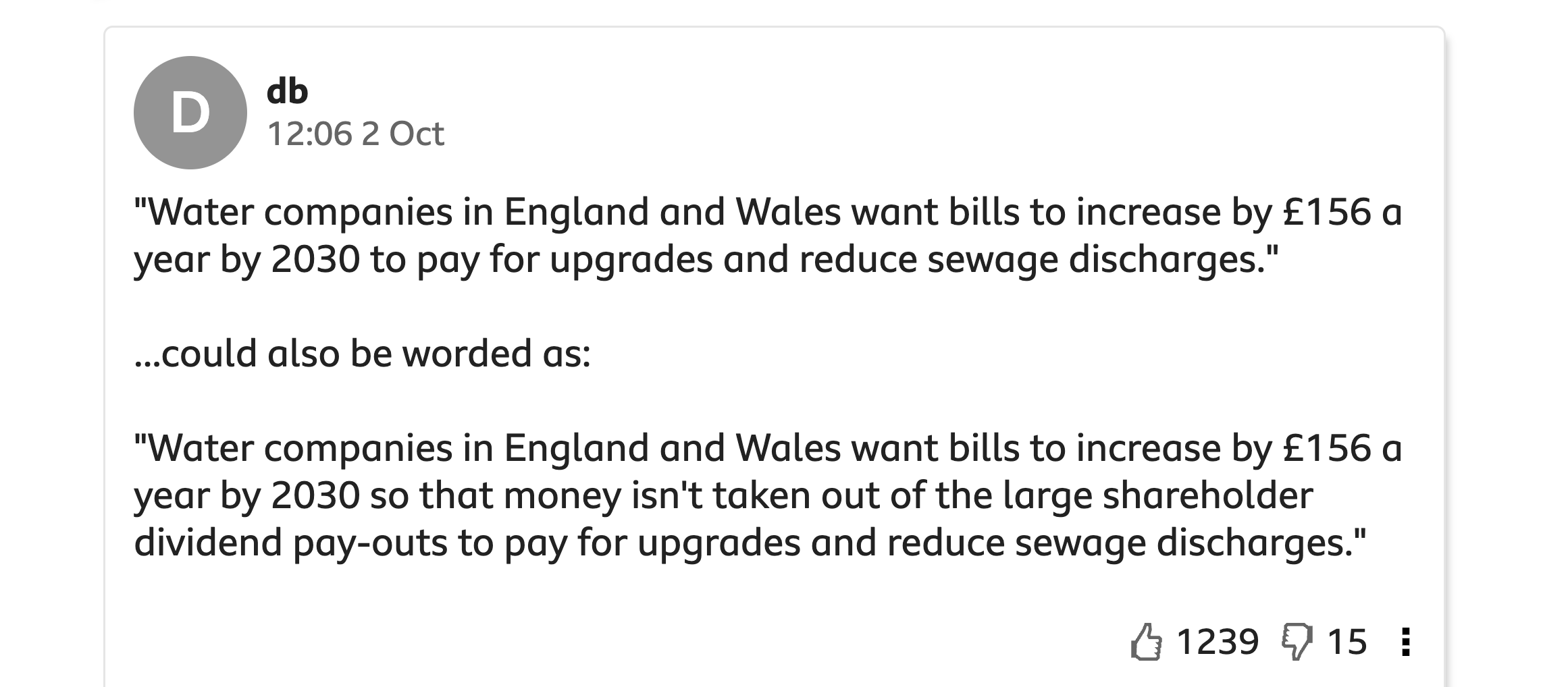
Screenshot of comment section under BBC's article "Water firms want bill rises to cut leaks and spills." /CFP
Screenshot of comment section under BBC's article "Water firms want bill rises to cut leaks and spills." /CFP
What's still needed:
Raw sewage, which contains harmful bacteria and viruses, poses a threat to both human health and wildlife. It also has nutrients that aid the development of algal blooms, which prevent light from reaching deeper layers of water and thus stops plants' photosynthesis. They can even reduce the oxygen content of water, worsening the habitat quality for wildlife.
Water companies in England need to upgrade the dated pipes and other facilities to keep pace with increasing populations and more intense rainfall, especially under the backdrop of climate change.
The regulators need to step up monitoring to prevent illegal raw sewage discharging and curb storm spills.
Right now, the British government needs to decide whether it will allow households' water bills to rise, or if it has other options on the decision as to who should pay for the investment that the water companies need.
(Cover image: An aerial view shows the sedimentation tanks at the Thames Water Long Reach water treatment facility on the banks of the Thames estuary in Dartford, east of London, on March 3, 2023. /CFP)
(If you have specific expertise and want to contribute, or if you have a topic of interest that you'd like to share with us, please email us at nature@cgtn.com.)